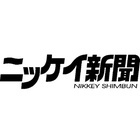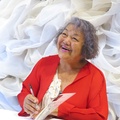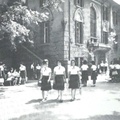If the fourth-generation visa is a success and fifth and sixth generation Japanese are able to come to Japan to work and learn about Japanese culture, then surely this visa system could be an important system that will determine the future of the Japanese community? Based on this understanding of the problem, we held a roundtable discussion with Fukasawa Masayuki, editor-in-chief of the Nikkei Shimbun, and invited Shimano Patricia, a former dekasegi worker who became a lawyer in Brazil after returning to Brazil, and Nagai Yasuyuki, executive director of the Center for Information and Assistance for Overseas Workers (CIATE), who is at the forefront of dealing with dekasegi issues.
We are now in an era where the children of dekasegi workers are becoming lawyers, and by giving more serious thought to the future framework for working in Japan, we may be able to produce the next generation of talent. Now that the future course of events has become clearer, House of Representatives member Mikio Shimoji has held his second explanatory meeting on the fourth generation visa system, and he is asking what the visa system for visitors to Japan should be like. (This roundtable discussion was held in June 2018, and has been revised to reflect changes in the situation since then.)
Patricia Shimano
Born in Maringa, Paraná in 1985. Visited Japan at the age of 10 and graduated from a public high school in Japan. After returning to Brazil in 2009, he attended law school and passed the bar exam in 2014. He is a Brazilian lawyer. In January 2018, he returned to Japan as a trainee in the JICA Japanese-related training program, a corporate law course for promoting cooperation with small and medium-sized enterprises. He is currently working at a major law firm and continues to support Japanese companies.
Yasuyuki Nagai
Born in Aichi Prefecture. 42 years old. Japanese lawyer. Registered with the Aichi Bar Association in 2009. In 2015, he was appointed Executive Director of the Center for Information and Assistance for Overseas Workers (CIATE) in São Paulo, where he provides free consultations for various types of workers in Japan at the CIATE office on the first floor of Bunkyo Building on San Joaquim Street.
*****
A Brazilian lawyer who grew up in Japan
[Fukazawa] We invited two lawyers who are knowledgeable about issues of working in Japan to talk about what should be done about the visa system between Japan and Brazil, looking to the future, especially in light of the 110th anniversary, in relation to the fourth-generation visa that just started in July.
As a wonderful example to draw on, I would like to start by hearing about the experiences of Patricia Shimano, who grew up in Japan and became a lawyer after returning to Brazil. How old were you when you went to Japan?
[Shimano] My mother was going to Japan to work, so I was taken there when I was 10 years old.
[Fukazawa] What was your level of Japanese at that time?
[Shimano] Absolutely nothing.
[Fukazawa] So you went to Japan with no experience and transferred to a public elementary school?
[Shimano] I was in the fifth grade.
[Fukazawa] Eh? It must have been hard to learn Japanese starting from the fifth grade of elementary school. It must be hard to start from the higher grades. They say that if possible, you should start in the lower grades, and at the latest in the middle grades.
[Shimano] Yes, that's right.
[Fukazawa] And that started in the upper grades... It must have been hard to keep up with the classes, right?
[Shimano] Yes, it was difficult. The culture and customs at school are completely different. In Brazil, you have to have your ears pierced when you're born. But in Japan, it's strictly forbidden. That's where the problem started.
[Fukasawa] That's right.
[Shimano] Without realizing it, I once entered school with my shoes still on...
[Fukazawa] So no one gave you any guidance like that at first?
[Shimano] I was the first Brazilian at my school.
[Fukasawa] Which prefecture is it?
[Shimano] Okazaki City, Aichi Prefecture.
[Fukasawa] It seems like there are a lot of Brazilians in Aichi Prefecture.
[Nagai] How many years was that?
[Shimano] 1995.
[Fukazawa] Quite a few Brazilians have already gone there.
[Shimano] There were probably fewer children at that time.
[Fukasawa] I see.
[Nagai] It's only been five years since the boom began.
[Shimano] I think it was around the time they started calling their families over.
[Fukazawa] So you were accepted like the first Brazilian at school, and the school didn't know how to accept you.
[Shimano] I joined the company in an uncertain situation.
[Fukazawa] Well, both are difficult. Were you bullied at school?
[Shimano] I don't like the word "bullying." I didn't know what to do to be accepted, and it was the first time they were dealing with a foreigner, so it was a shock. For me, it wasn't so much that I was bullied, but rather that I wasn't accepted well.
[Fukazawa] There was no preparation at all to accept them, and they just went ahead and did it, which didn't feel very good for either party.
[Shimano] That's right.
[Fukasawa] Didn't you end up refusing to go to school?
[Shimano] I didn't. My mom told me to just go.
[Fukazawa] But even though you were listening to the lectures, you didn't understand anything at all.
[Shimano] Not at all. So I spent the whole day just looking at the blackboard, not the words written there.
[Fukazawa] It's tough. I'm sure there would be someone like a teaching assistant next to you now.
[Shimano] I was really crying. I didn't want to go every day.
[Fukasawa] How many years did it take you to be able to keep up with the classes?
[Shimano] I went to Japan at the end of the fifth grade of elementary school, and I think it was around the second year of junior high school. It was just before I decided to go to high school.
[Fukazawa] If you were able to keep up with the classes by the time you were in the second year of junior high school, did you study a lot during that time?
[Shimano] No, I don't remember that (laughs).
[Fukazawa] You have to study really hard to understand the lessons in two or three years. And when you get to middle school, the content suddenly becomes more difficult.
[Shimano] Yes. To be precise, it wasn't that I was able to keep up with my studies, but rather that I was able to understand everyday conversation and communicate with others by the time I was in the second year of junior high school.
[Nagai] Were you able to read the characters as well?
[Shimano] I can now read hiragana, katakana, and kanji at the lower elementary school level.
*This article is reprinted from the Nikkei Shimbun ( August 18th and 19th , 2018).
© 2018 Masayuki Fukasawa / Nikkey Shimbun






